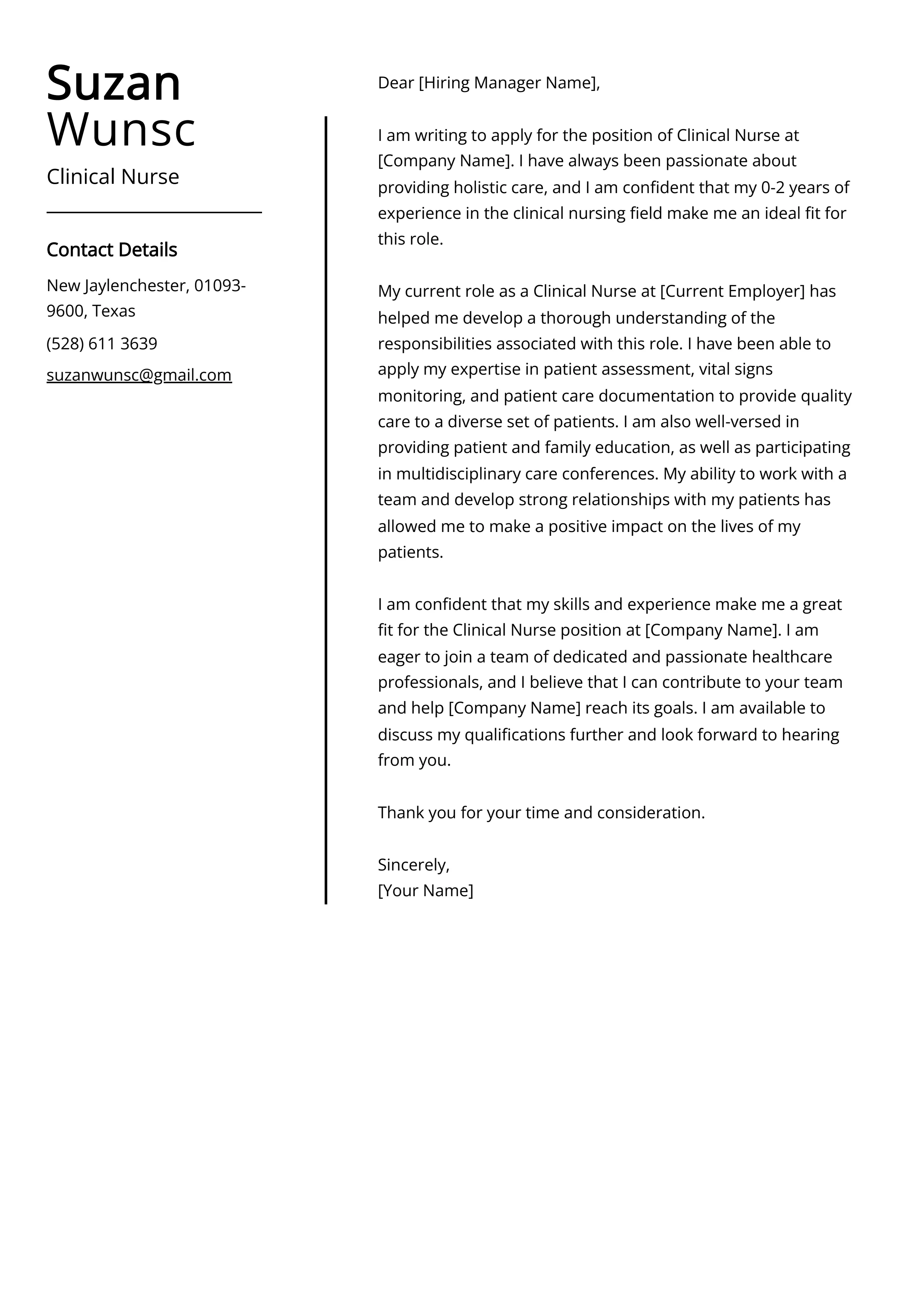Understanding the Importance of an RN Job Cover Letter
In the competitive field of nursing, securing your dream RN job requires more than just a stellar resume. A well-crafted RN job cover letter is your chance to make a strong first impression and showcase why you’re the perfect fit for the role. It’s a personalized introduction that allows you to elaborate on your qualifications, demonstrate your enthusiasm, and highlight the unique value you bring to the healthcare facility. The cover letter is your voice, providing context to your resume and allowing you to connect with the hiring manager on a more personal level. It’s an opportunity to stand out from the crowd and make a lasting impact, increasing your chances of getting that all-important interview.
Why a Cover Letter Matters
A cover letter serves as a critical bridge between your qualifications and the specific requirements of the RN job. It allows you to address the employer directly, expressing your interest in their facility and the specific position. It goes beyond the bullet points of your resume, enabling you to weave a narrative that highlights your relevant experience, skills, and accomplishments. This narrative helps the hiring manager understand how your background aligns with their needs. A cover letter also demonstrates your communication skills, attention to detail, and professionalism – all essential qualities for a registered nurse. By taking the time to write a thoughtful cover letter, you show the employer that you are genuinely interested in the position and that you’ve invested time in understanding their needs.
How a Cover Letter Complements Your Resume
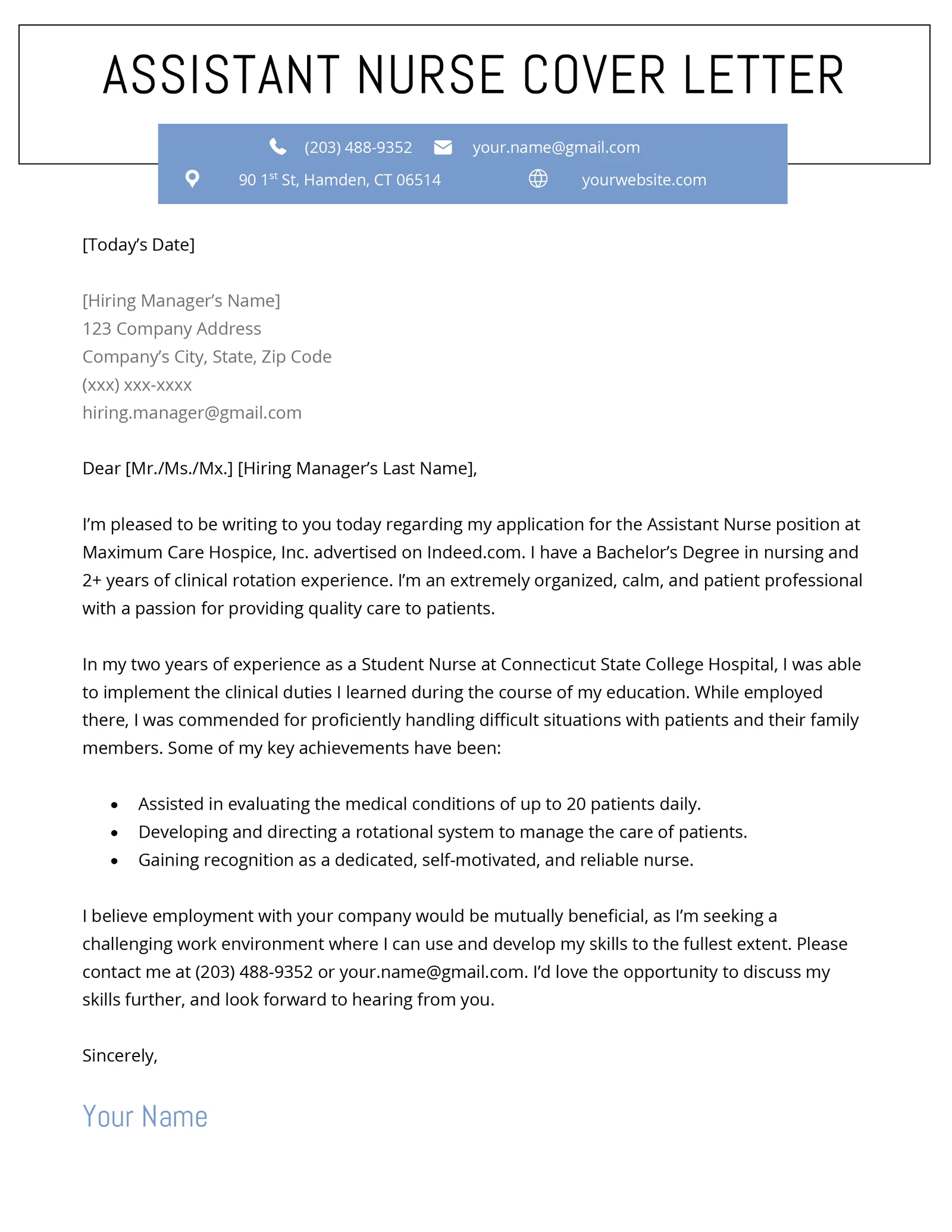
While your resume provides a concise overview of your experience and qualifications, the cover letter allows you to expand on these points and make a more compelling case. The cover letter provides context and depth to the information presented in your resume. You can use the cover letter to explain gaps in your employment history, highlight specific achievements, and showcase how your skills and experience align with the job’s requirements. Furthermore, a cover letter allows you to demonstrate your personality and express your passion for nursing. It’s a chance to show the hiring manager that you’re not just qualified but also a great fit for their team and organizational culture. It’s a chance to make your application truly memorable.
Key Components of a Successful RN Cover Letter
Contact Information and Formatting
Start your cover letter with your contact information (name, address, phone number, and email) at the top. Include the date and the hiring manager’s name (if you know it), title, and the healthcare facility’s address. Use a professional and easy-to-read font like Times New Roman or Arial, with a font size between 10 and 12 points. Maintain consistent formatting throughout the document and use single spacing within paragraphs and double spacing between paragraphs. Keep the letter concise, ideally within one page, and ensure that it’s free of grammatical errors and typos. Proofreading is crucial for maintaining professionalism and making a positive impression.
Crafting a Compelling Opening
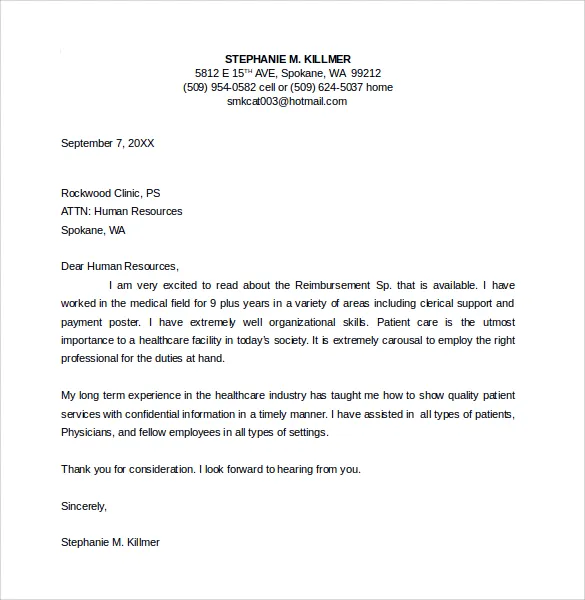
Your opening paragraph is your first chance to grab the hiring manager’s attention. Start by stating the position you’re applying for and where you saw the job posting. Then, make a strong statement that expresses your enthusiasm for the role and the healthcare facility. Briefly mention a key skill or experience that makes you an excellent fit. For example, ‘I am writing to express my keen interest in the Registered Nurse position at [Healthcare Facility Name], as advertised on [Platform]. With my five years of experience in critical care and my passion for patient-centered care, I am confident I can make a significant contribution to your team.’ This creates an immediate connection and sets the tone for the rest of your letter.
Highlighting Your Skills and Experience
In the body of your cover letter, highlight your most relevant skills and experience as they relate to the job description. Review the job posting carefully and identify the key requirements and preferred qualifications. Then, provide specific examples from your professional history that demonstrate how you meet those requirements. Use action verbs to describe your accomplishments and focus on what you’ve achieved in previous roles. For example, instead of saying ‘Assisted patients,’ say ‘Managed a caseload of 20+ patients daily, providing comprehensive care including medication administration, wound care, and patient education.’ This approach shows, rather than tells, the hiring manager about your capabilities.
Quantifying Your Achievements
Whenever possible, quantify your accomplishments to provide concrete evidence of your impact. Use numbers, statistics, and metrics to showcase your success. For example, instead of saying ‘Improved patient outcomes,’ say ‘Improved patient satisfaction scores by 15% through the implementation of a new patient education program.’ Similarly, you can say ‘Reduced medication errors by 10% through the introduction of a new medication reconciliation process.’ Quantifiable achievements add credibility to your claims and make your application more persuasive. They give the hiring manager a clear sense of the value you can bring to their organization.
Demonstrating Your Passion for Nursing
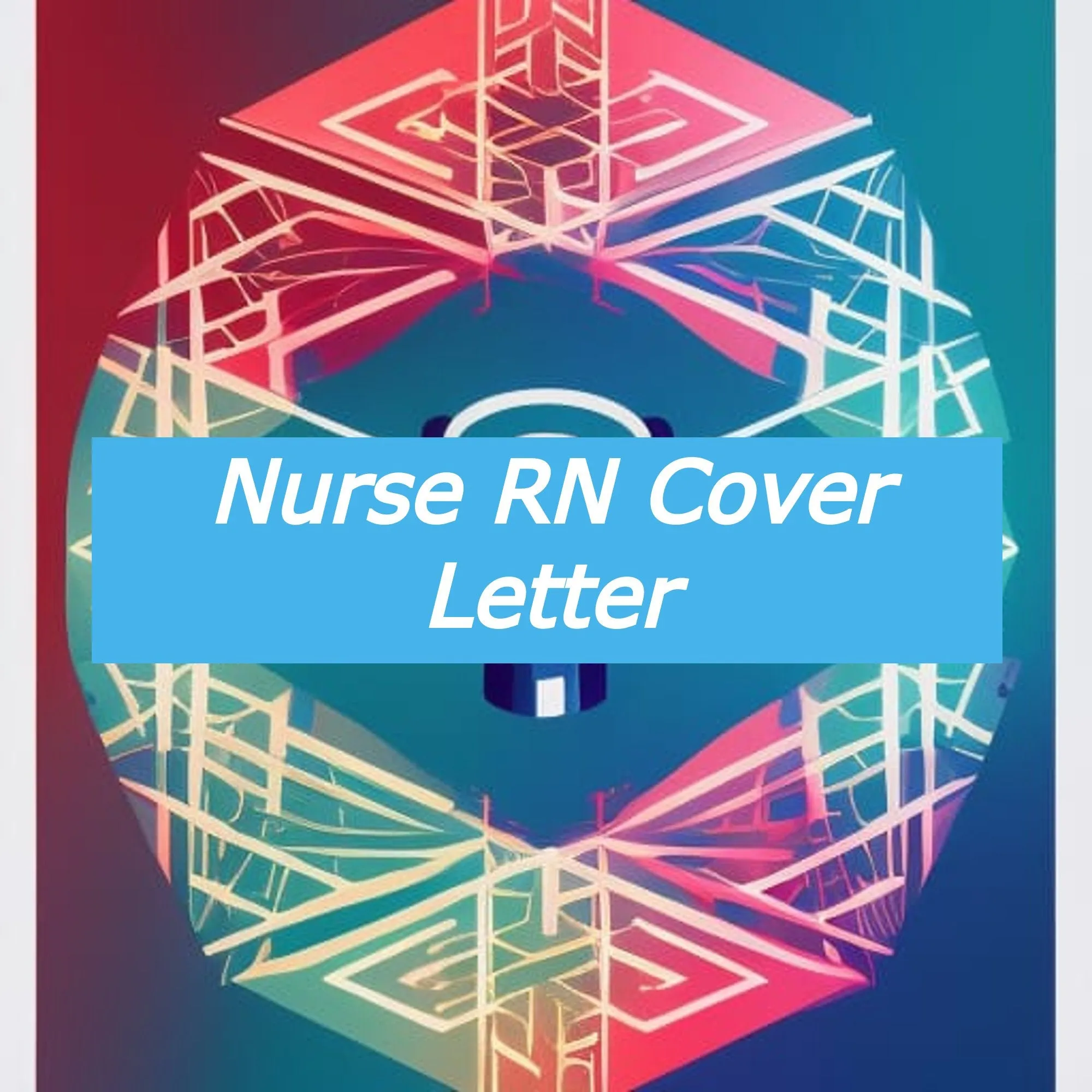
Your cover letter is an opportunity to demonstrate your genuine passion for nursing and your commitment to patient care. Share why you chose nursing as a profession and what motivates you. Describe your philosophy of care and your approach to patient interactions. Express your interest in the specific healthcare facility and its mission. If possible, mention any specific programs or services offered by the facility that align with your interests and career goals. This demonstrates that you’ve done your research and that you’re truly invested in joining their team.
Tailoring Your Cover Letter to the Job
Researching the Healthcare Facility
Before writing your cover letter, research the healthcare facility to understand its mission, values, and patient population. Visit their website, read about their services, and if possible, speak to current or former employees. This research will help you tailor your cover letter to their specific needs and demonstrate your genuine interest in working there. Tailor your letter to show that your skills and experience align perfectly with their specific requirements and values. Make specific references to their programs, initiatives, or patient care philosophy to showcase your knowledge and dedication.
Matching Your Skills to the Job Description
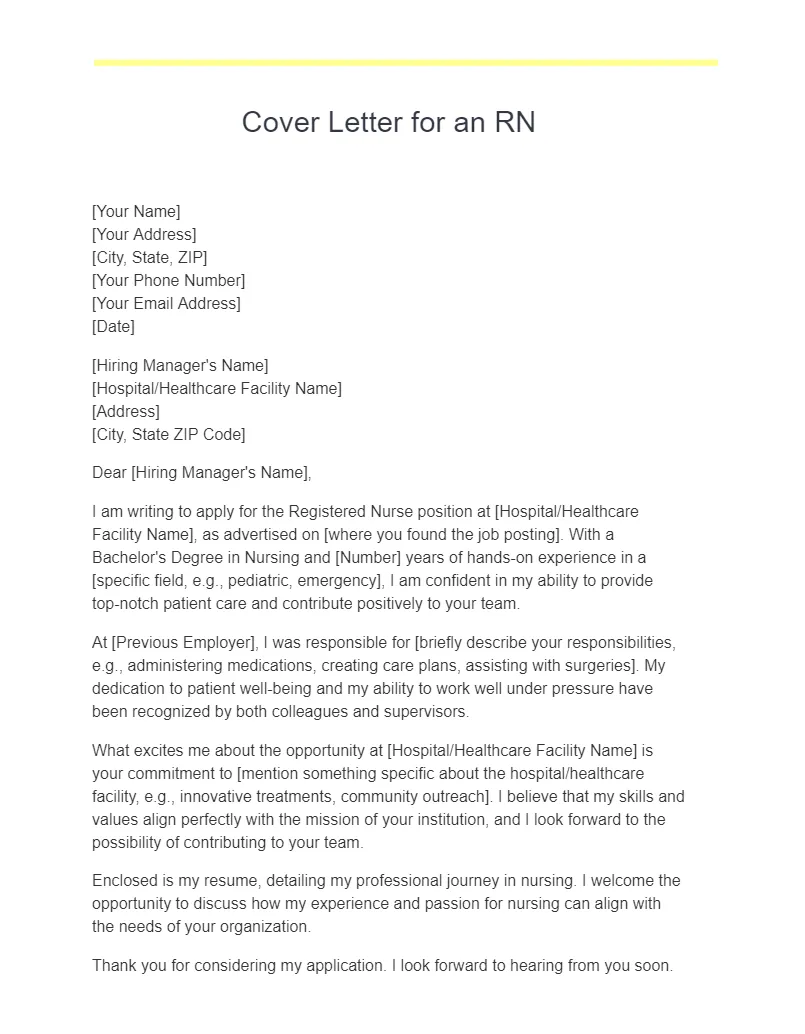
Carefully review the job description and identify the key skills and qualifications required for the RN position. Then, use your cover letter to explicitly connect your skills and experience to those requirements. Provide specific examples that demonstrate how you’ve successfully used those skills in previous roles. For instance, if the job description emphasizes experience with electronic health records, highlight your proficiency with a specific EHR system and give examples of how you used it to improve patient care or efficiency. Customizing your letter in this way shows the hiring manager that you possess the specific skills needed to excel in the role.
Showcasing Your Professionalism
Maintain a professional tone throughout your cover letter. Use formal language and avoid slang or jargon. Proofread your letter carefully to eliminate any grammatical errors or typos. Ensure that your formatting is consistent and visually appealing. Address the hiring manager by name (if possible) and tailor your letter to the specific healthcare facility. By demonstrating professionalism, you will make a positive impression and show the employer that you take your application seriously.
Writing a Strong Closing
Expressing Your Enthusiasm
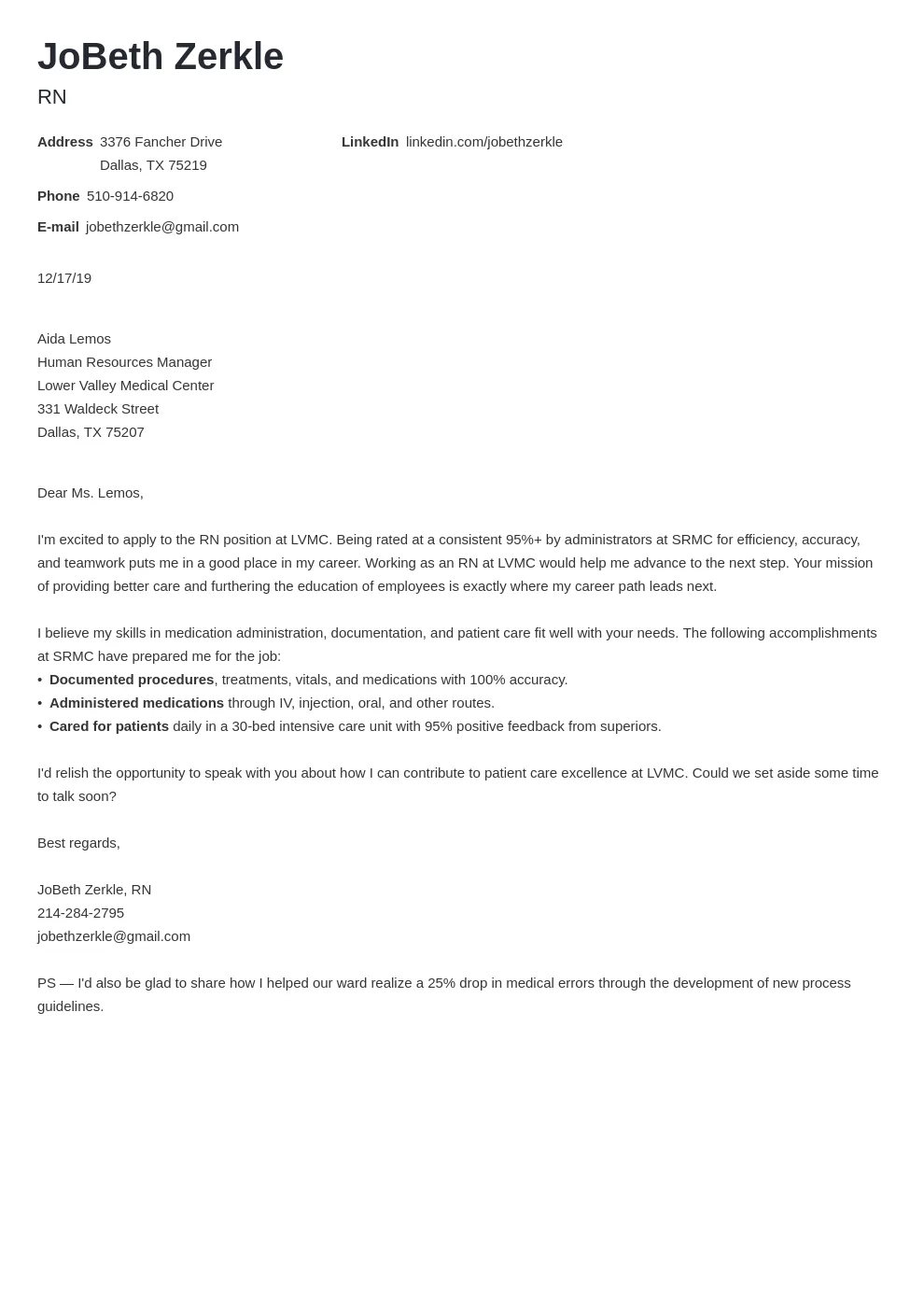
In your closing paragraph, reiterate your enthusiasm for the position and the opportunity to join the healthcare facility. Reiterate your key qualifications and reiterate why you are a good fit for the job and the organization. This is the last opportunity to make a strong impression, and you want to leave the hiring manager with a positive and memorable message.
Including a Call to Action
End your cover letter with a clear call to action. Express your eagerness to discuss your qualifications further and indicate your availability for an interview. You can say something like, ‘Thank you for your time and consideration. I am eager to learn more about this opportunity and discuss how my skills and experience can benefit your team. I am available for an interview at your earliest convenience.’ This proactive approach signals your interest and makes it easier for the hiring manager to contact you.
Proofreading and Editing Your Cover Letter
Checking for Grammatical Errors
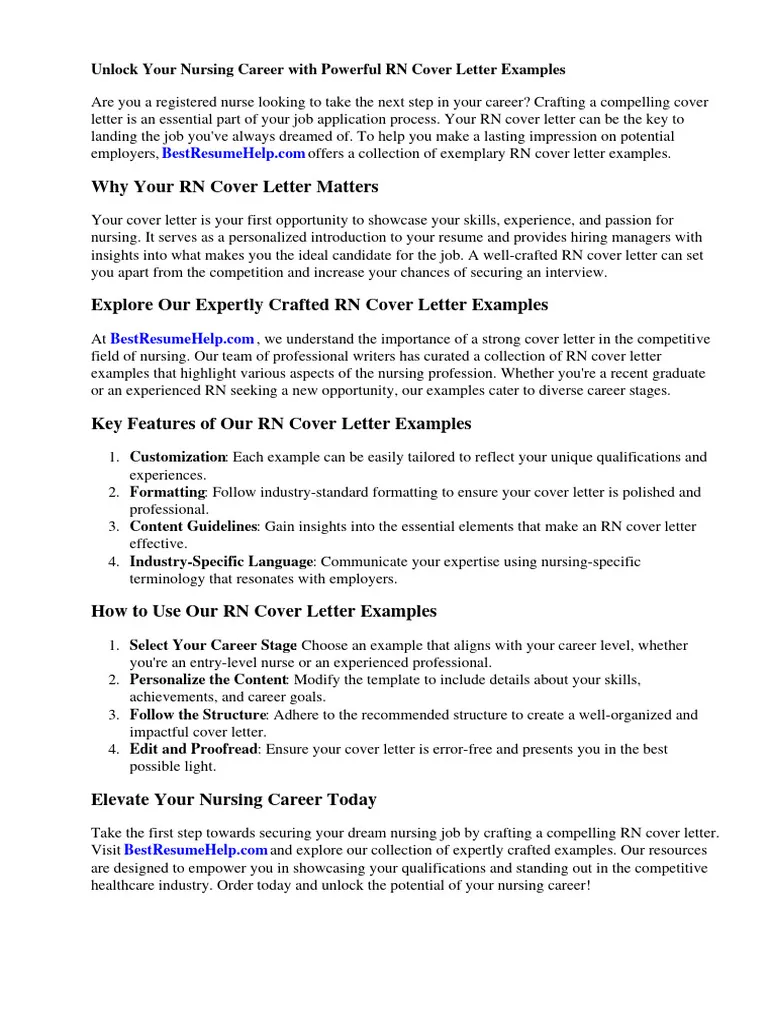
Before submitting your RN job cover letter, proofread it meticulously for any grammatical errors. Typos and grammatical mistakes can undermine your credibility and leave a negative impression on the hiring manager. Read your letter aloud, use a grammar checker, and ask a friend or colleague to review it for you. Ensuring your cover letter is free of errors is essential for demonstrating your attention to detail and professionalism.
Ensuring a Professional Tone
Maintain a professional and respectful tone throughout your cover letter. Avoid using casual language, slang, or informal contractions. Your cover letter should be concise and direct, avoiding overly wordy sentences or repetitive phrasing. Strive for a balance between enthusiasm and formality. You want to come across as approachable and passionate, but also as a competent professional who understands workplace etiquette. By ensuring a professional tone, you’ll demonstrate your understanding of professional communication standards.
Formatting for Readability
Make sure your cover letter is easy to read. Use a clear and professional font like Arial or Times New Roman, with a font size between 10 and 12 points. Ensure that the margins are consistent and that the text is properly aligned. Use adequate spacing between paragraphs to give the reader’s eye a break. Break up long blocks of text into shorter paragraphs. Proper formatting enhances readability, making it easier for the hiring manager to absorb the key information you are presenting.
